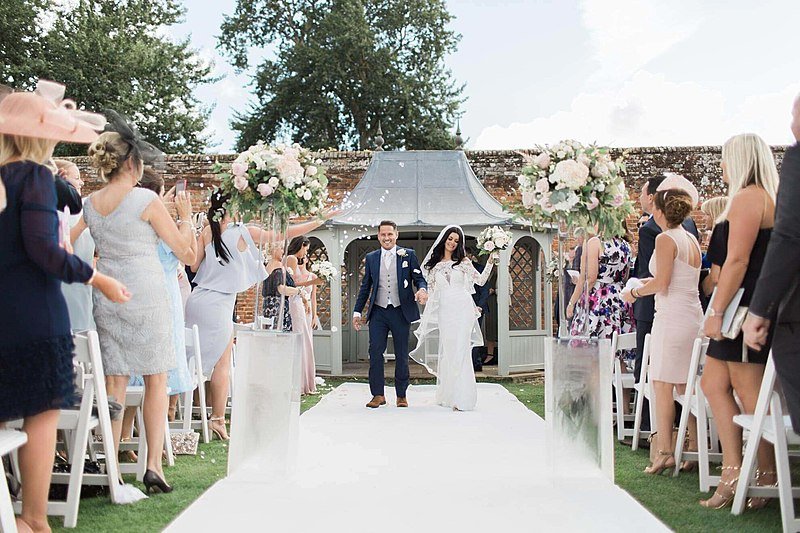Starting the wedding planning by trying out wedding dresses, or going to cake tasting can be very exciting. But once you get on the nitty-gritty details, you figure out that it’s work that can bog you down. Planning a wedding is no easy task, and this is why many couples hire planners to help them pull off the biggest party of their lives. Having a wedding planner by your side to help with mundane tasks like making sure you rent out the correct number of tables and chairs, and making sure if the caterers is available can help transform a good wedding into a great one.
Hiring a wedding planner is another big expense for the wedding, but they are a total sanity saver. They can make the months leading up to your big day less stressful and more enjoyable.
So, what are the things to consider before you hire a wedding planner? Here are the tips to remember:
1. Do some research
Is there any friend or relative of yours who have recently gotten married? Do you remember attending a wedding where everything was smooth? You can ask a recently married couple you know if they hired a wedding planner and if they can recommend them. It’s best to look for any connections first, because you would better trust the people who are close to you.
If there are no recent weddings from your network, you can look up websites and see what types of wedding event planners in your area have specialized in. Look up the customer reviews of a specific event planner and make sure you get positive feedbacks you expect.
2. Meet face to face
Narrow down your choices up to four. You can give them a call and schedule a meeting to decide which one can fit in with your plans. Ask questions, but jot them down along with your ideas ahead of time. Discuss your vision and determine what ideas they have that can help bring your dream wedding to life. Look at their portfolio and check if you are satisfied with their work.
Most of all, the purpose of meeting face to face is to get to know them. It would be hard to get to know a person if you are just talking over the phone. You will be working with a wedding planner from the date of hiring until your wedding day, so make sure you have not only the same goals but compatible personalities. This way, working together will not only be productive but also enjoyable.
3. Know their strengths and passions
This one comes first from research. Before you even consider a planner, find out a little more about them, their experience and background. Are they a head of catering at a hotel? Are they an events manager and not just a wedding planner? Or are they a long-time party planner with decades of experience? Considering these strengths and experience is something you must do so you’ll have a better sense of ways they will be able to help with your wedding. Also, think about these strengths and how it can complement with your own.
For instance, if you’ve already set your mind on a certain design and theme but you need help keeping it all straight, look for a planner with a management experience. If your organizational skills are fantastic but you do not have the creative mind to visualize the perfect wedding scene, a planner with serious artistic talent will be perfect for you. If you do not have all these things, it’s best for you to pick an expert in the biz who can handle everything.
Once you pick out a matching planner for you, let them do what they do. Most people who enter the wedding planning business do it because they love it, and because events planning is what keeps their passion alive. Sure, their job is to execute the wedding that you wanted, but you might be surprised with the new ideas they can come up with you to make your wedding better if you give them some flexibility. You may have an idea for every detail of your wedding, but give them a chance to suggest ideas that can help elevate the event and sometimes, even lessen your expenses.
4. Determine what matters most to you
Decide on one thing (or things) that you want to be the takeaway of your wedding – something that will make guests remember your party after years. For example, if you want to ensure that everyone will be incredibly satisfied and amazed with your food, choose a planner who had experience in the catering biz, for they will have many recommendations for a chef and a catering team. If you want everyone to have an incredible dance party, consider spending more of your budget on hiring an amazing band, and it’s better if the wedding planner already had a connection with the musicians’ managers. If you want a boho beach wedding, look for a planner who has an experience in planning an outdoor wedding – because there are things they would know that other wedding planners who only worked on indoor venues hasn’t experienced.
5. Talk about money
Be upfront with how much money you can spend and how it will be allocated for every detail of your wedding. This isn’t a fun part, but it’s absolutely necessary to talk about with your partner and your wedding planner. This will help keep costs aligned and on target, and to give your planner an idea on what suppliers and rentals to consider and what not to consider. A wedding planner can help you get the most out of every dollar you spend.
6. Know who is paying
Before you talk to a wedding planner, it would be better if you and your partner have already talked about who’s paying for what. Wedding planners are typically tasked for coordinating final payments, which are usually due on the day of the wedding or immediately after the event, so that the bride and groom will not worry about it and just enjoy their celebration with their guests. Talking about the budget allocation will not only allow proper planning and communication, and will also help avoid awkward conversations when you are working together in the future.
7. Allow extra investment
You might be tempted to go for a less expensive planner so you can keep some extra money in your budget, but a planner whose rate is $2,000 may actually save you more money in the long run. A wedding planner with higher fees typically have fewer clients (which means more time to devote in working with you for your wedding) and more experience (which means they know if something’s worth it and what can be nixed from your budget. They can help you spend smarter, and they are less likely to make mistakes that may cause
8. Don’t ask for recommendations before signing a contract
A planner can give a sneak peek into their services during your initial meetup as they show you their portfolio, don’t ask them to give you recommendations before you’ve officially hired them. The first interview isn’t the time to ask them the price range of a certain venue you are eyeing, or if they can recommend a great photographer or a caterer for a certain cuisine. You don’t want to give away your expertise for free, either.
9. Do not ask for discounts
The wedding business is competitive, so most vendors will already give you their best pricing in hopes of getting a deal with you as their client. Trust them and look for the value of the vendors you are hiring instead of the savings. Don’t ask for your planners to ask vendors for a discount, either. Trust their network – they will never recommend a photographer or a flower supplier if they had a negative experience with them or if they know they are overcharging for their quality of service, because this will reflect on them. As much as possible, they will be recommending those that they have worked with before and they know their value, work ethic and consistency in performance, and it will be frustrating for a planner if their client doesn’t find the same value with their networks.
If you find yourself making complaints all the time about the prices – check if are you really financially ready to get married and have a wedding. Consider beforehand that before you plan a wedding and before you hire a planner, you will be spending significant amount of bucks.
10. Remember that they are business professionals
Even if you have built a good rapport with your planner and you feel that you can be friends even after your wedding – respect their time and be mindful of business hours. Don’t expect them to answer your texts at 12 midnight on a Monday. If you are going to contact your planner, it’s best to do so during business hours, or use email instead. Texts are too casual for the planning process, and details can get lost. Emails will be a more organized communication, and there will be more space to explain an idea or a question through an email. If the concern is hard to communicate through email, it’s best to schedule a time for meetup.
Also, know when the wedding season is. If your planner is totally booked, avoid calling or texting them especially on the weekends when a lot of weddings happen. Chances are he or she is helping out and assisting another bride on her wedding day and will be giving that other bride his or her full attention. You don’t want your wedding planner busy talking with her other clients on your wedding day, either.

